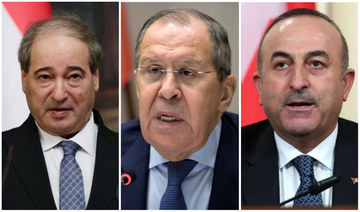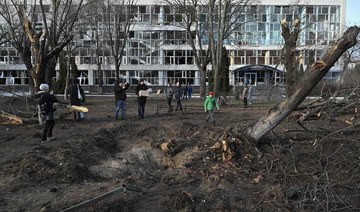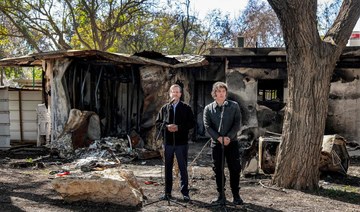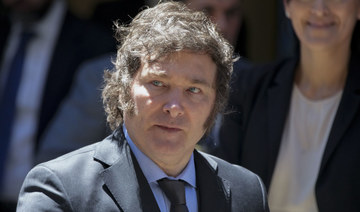KYIV, Ukraine: Emergency crews on Tuesday sifted through the rubble of a building struck by Ukrainian rockets, killing at least 63 Russian soldiers barracked there, in the latest blow to the Kremlin’s war strategy as Ukraine says Moscow’s tactics could be shifting.
An Associated Press video of the scene in Makiivka, a town in the partially Russian-occupied eastern Donetsk region, showed five cranes and emergency workers removing big chunks of concrete under a clear blue sky.
In the attack, which apparently happened last weekend, Ukrainian forces fired rockets from a US-provided HIMARS multiple launch system, according to a Russian Defense Ministry statement.
It was one of the deadliest attacks on the Kremlin’s forces since the war began more than 10 months ago and an embarrassment that stirred renewed criticism inside Russia of the way the war is being conducted.
The Russian statement Monday about the attack provided few other details. Other, unconfirmed reports put the death toll much higher.
The Strategic Communications Directorate of Ukraine’s armed forces claimed Sunday that around 400 mobilized Russian soldiers were killed in a vocational school building in Makiivka and about 300 more were wounded. That claim couldn’t be independently verified. The Russian statement said the strike occurred “in the area of Makiivka” and didn’t mention the vocational school.
Satellite photos analyzed by The AP show the apparent aftermath of the strike. An image from Dec. 20 showed the building standing. One from Jan. 2 showed it in ruins. Other days had intense cloud cover, making it impossible to see the site by standard satellite imagery.
Vigils for soldiers killed in the strike took place in two Russian cities Tuesday, the state RIA Novosti agency reported.
In Samara, in southwestern Russia, locals gathered for an Orthodox service in memory of the dead. The service was followed by a minute’s silence, and flowers were laid at a Soviet-era war memorial, RIA reported.
Unconfirmed reports in Russian-language media said the victims were mobilized reservists from the region.
With the fighting raging much longer than anticipated by the Kremlin, and becoming bogged down in a war of attrition amid a Ukrainian counteroffensive backed by Western-supplied weapons, Russian President Vladimir Putin is mulling ways of regaining momentum.
In a video address late Tuesday, Ukrainian President Volodymyr Zelensky said his country needs to strengthen its defenses in the face of what he described as Russian plans for a new offensive.
“There is no doubt, that todays bosses of Russia will gather all they can to try to reverse the battlefield situation or at least delay their defeat,” he said. “We must derail that Russian scenario and are getting ready for it.”
In comments a day earlier, Zelensky had claimed the Kremlin plans to step up the use of Iranian-made exploding drones.
“We have information that Russia is planning a prolonged attack by Shaheds (exploding drones),” he said Monday night.
Zelensky said the goal is to break Ukraine’s resistance by “exhausting our people, (our) air defense, our energy.”
For the Russian military, the exploding drones are a cheap weapon which also spreads fear among the enemy. The United States and its allies have sparred with Iran over Tehran’s role in allegedly supplying Moscow with the drones.
The Institute for the Study of War said Putin is striving to strengthen support for his strategy among key voices in Russia.
“Russia’s air and missile campaign against Ukraine is likely not generating the Kremlin’s desired information effects among Russia’s nationalists,” the think tank said late Monday.
“Such profound military failures will continue to complicate Putin’s efforts to appease the Russian pro-war community and retain the dominant narrative in the domestic information space,” it added.
Meanwhile, drone advances in Ukraine have accelerated a trend that could soon bring the world’s first fully autonomous fighting robots to the battlefield. Experts say it may be a matter of time before Russia or Ukraine deploy them.
Putin’s additional reliance on currently available drones might not help him achieve his goals, however, as Ukraine claims a high success rate against the weapons. Even so, part of the intention of using drones is to exhaust Ukrainian air defenses.
During the first two days of the new year, which were marked by relentless nighttime drone attacks on Ukrainian cities and energy infrastructure, the country’s forces shot down more than 80 Iranian-made drones, Zelensky said.
Since September, Ukraine’s armed forces have shot down almost 500 drones, Ukrainian air force spokesman Yurii Ihnat claimed in a television interview Tuesday.
As well as seeking to wear down resistance to Russia’s invasion, the long-range bombardments have targeted the power grid to leave civilians at the mercy of biting winter weather.
In the latest fighting, a Russian missile strike overnight on the city of Druzhkivka in the Donetsk region wounded two people, the deputy head of Ukraine’s presidential office, Kyrylo Tymoshenko, reported Tuesday.
The Russian military on Tuesday acknowledged strikes on Druzhkivka and Kramatorsk, also in Donetsk. The Defense Ministry claimed it destroyed four HIMARS launchers in the area. This claim could not be independently verified.
A reporter with French broadcaster TF1 was live on television screens when a blast from one of the strikes erupted behind him in Druzhkivka. A German reporter with Bild newspaper suffered a minor injury from shrapnel in the same bombardment.
Officials said the attack ruined an ice hockey arena described as the largest hockey and figure skating school in Ukraine.
In recently retaken areas of the southern Kherson region, Russian shelling on Monday killed two people and wounded nine, Kherson’s Ukrainian governor, Yaroslav Yanushevych, said Tuesday. He also said two people were killed in the Kherson region Tuesday after driving over a mine.
In other developments Tuesday:
— Ukraine’s main security service said it was bringing criminal charges against two high-ranking Russian commanders accused of overseeing strikes against civilians.
The Security Service of Ukraine said on its website that it had collected a “high-quality body of evidence” against Sergei Kobylash, commander of Russia’s long-range aviation force, and Igor Osipov, the former head of the Russian Black Sea Fleet. The two are charged under Ukrainian law with violating the country’s territorial integrity and with “planning, preparing, initiating and conducting a war of aggression,” which carry a maximum sentence of life in prison.
Although it is unlikely that Kyiv will be able to bring Kobylash and Osipov to trial in the near future, the announcement marks the first time Ukrainian authorities brought charges linked directly to attacks on residential areas and civilian infrastructure.
— Ukraine’s chief military officer, Gen. Valerii Zaluzhnyi, said he had his first phone call this year with US Gen. Mark Milley, Chairman of the Joint Chiefs of Staff.
Zaluzhnyi said on Facebook that he told Milley about heavy battles around Svatove-Kreminna and in the direction of Lysychansk. “The most difficult situation remains in the Soledar-Bakhmut-Mayorsk area,” he said, adding that the Russians are trying to advance by “effectively marching on corpses of their own.” He said Ukrainian forces securely keep their defenses in the Zaporizhzhia region and make efforts to protect Kherson from Russian shelling, while the situation along the border with Belarus is fully controlled.























